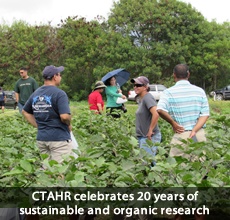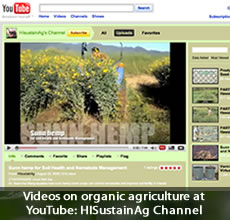E Komo Mai | Welcome
Organic Agriculture at CTAHR
Organic agriculture relies heavily on an ecological balance within the production system and avoids the use of many synthetic inputs. The management of organic agricultural systems can therefore be particularly complex and challenging. Despite these challenges, the demand for organic products continues to increase, and organic systems are an important and growing part of Hawai'i agriculture. It is therefore the mission of Organic Agriculture Working Group at the University of Hawaii's College of Tropical Agriculture and Human Resources (CTAHR) to:
- Improve the production, marketshare and quality of organic agricultural products in Hawai'i,
- Increase our understanding of ecological processes in organic systems, and
- Develop new academic program options for undergraduate and graduate students interested in organic agriculture.
In working towards the accomplishment of this mission, we strive to demonstrate the benefit of promoting ecological processes in all agricultural systems and to make CTAHR the premier resource for ecological farming research and training in the Asia-Pacific region.
Introduction
The goal of organic production systems is to produce food of high nutritional quality in sufficient quantity by working with natural systems rather than seeking to dominate them. Organic growers encourage and enhance biological cycles within the farming system, involving plants, animals, microorganisms, and, most importantly, soil flora and fauna. In Hawai'i, over 140 certified organic producers form the foundation of an industry estimated to contribute approximately $15 million to the State's economy annually. If Hawaii's industry follows the National trend, that number is expected to grow by as much as 20% each year.
History
Hawai'i has a centuries-old tradition of sustainable food production.
Pre-contact Hawaiian agricultural systems were closely linked to the
natural environment to ensure long-term productivity and support hundreds
of thousands of people in these Islands. During the many changes that
have since taken place in Hawai'i , the University of Hawai'i has endeavored
to maintain agriculture's link with the ecology and biological cycles
of our Island home. For nearly 100 years, much work has been conducted
by CTAHR in its various incarnations and partnerships to develop and
improve agricultural technologies pertinent to organic growers. This
includes intensive cover crop research, promoting the importance of locally
grown produce, developing biological and cultural methods for controlling
pests without chemicals, and the use of biological nitrogen fixation
to significantly increase production of high protein foods while at the
same time reducing the need for commercially produced fertilizers.
Current Status
CTAHR continues to carry-on Hawaii 's sustainable agricultural tradition through the 21st century. Organic agriculture holds much promise for strengthening agriculture and expanding markets for local agribusinesses, and organic farming will continue to play a significant role in providing new opportunities for Hawaii 's farmers. Organic and other forms of sustainable agriculture are knowledge-intensive and will require a strong research and training infrastructure, which CTAHR will provide. Current programs include “Buy Fresh, Buy Local” promotion of Hawai'i-grown produce, the maintenance of long-term (13-year) organic research plots in Waimanalo, development and evaluation of natural products for pest control, and conventional breeding for pest and stress resistance in important crops.




